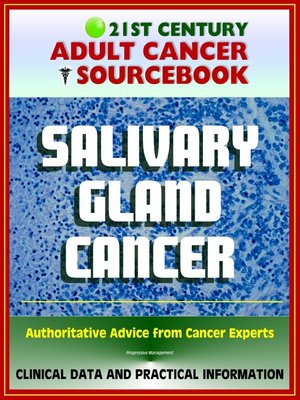21st Century Adult Cancer Sourcebook
ebook ∣ Salivary Gland Cancer--Clinical Data for Patients, Families, and Physicians
By Progressive Management

Sign up to save your library
With an OverDrive account, you can save your favorite libraries for at-a-glance information about availability. Find out more about OverDrive accounts.
Find this title in Libby, the library reading app by OverDrive.



Search for a digital library with this title
Title found at these libraries:
| Loading... |
Authoritative information and practical advice from the nation's cancer experts about salivary gland cancer includes official medical data on signs, symptoms, early detection, diagnostic testing, risk factors and prevention, treatment options, surgery, radiation, drugs, chemotherapy, staging, biology, prognosis, and survival, with a complete glossary of technical medical terms and current references.
Starting with the basics, and advancing to detailed patient-oriented and physician-quality information, this comprehensive in-depth compilation gives empowered patients, families, caregivers, nurses, and physicians the knowledge they need to understand the diagnosis and treatment of salivary gland cancer.
Comprehensive data on clinical trials is included - with information on intervention, sponsor, gender, age group, trial phase, number of enrolled patients, funding source, study type, study design, NCT identification number and other IDs, first received date, start date, completion date, primary completion date, last updated date, last verified date, associated acronym, and outcome measures.
Salivary gland cancer is a rare disease in which malignant (cancer) cells form in the tissues of the salivary glands. The salivary glands make saliva and release it into the mouth. Saliva has enzymes that help digest food and antibodies that help protect against infections of the mouth and throat.
More than half of all salivary gland tumors are benign (not cancerous) and do not spread to other tissues. Salivary gland cancer is a type of head and neck cancer. Being exposed to certain types of radiation may increase the risk of salivary cancer.
Although the cause of most salivary gland cancers is not known, risk factors include the following:
Possible signs of salivary gland cancer include a lump or trouble swallowing. Salivary gland cancer may not cause any symptoms. It is sometimes found during a regular dental check-up or physical exam. Symptoms caused by salivary gland cancer also may be caused by other conditions. A doctor should be consulted if any of the following problems occur: * A lump (usually painless) in the area of the ear, cheek, jaw, lip, or inside the mouth. * Fluid draining from the ear. * Trouble swallowing or opening the mouth widely. * Numbness or weakness in the face. * Pain in the face that does not go away.
Extensive supplements, with chapters gathered from our Cancer Toolkit series and other reports, cover a broad range of cancer topics useful to cancer patients. This edition includes our exclusive Guide to Leading Medical Websites with updated links to 81 of the best sites for medical information, which let you quickly check for updates from the government and the best commercial portals, news sites, reference/textbook/non-commercial portals, and health organizations. Supplemental coverage includes:
Levels of Evidence for Cancer Treatment Studies
Glossary of Clinical Trial Terms
Clinical Trials Background Information and In-Depth Program
Clinical Trials at NIH
How To Find A Cancer Treatment Trial: A Ten-Step Guide
Taking Part in Cancer Treatment Research Studies
Access to Investigational Drugs
Clinical Trials Conducted by the National Cancer Institute's Center for Cancer Research at the National Institutes of Health Clinical Center
Taking Time: Support for People with Cancer
Facing Forward - Life After Cancer Treatment
Chemotherapy and You






